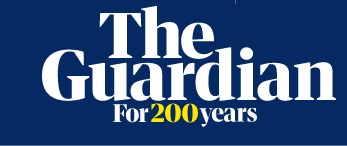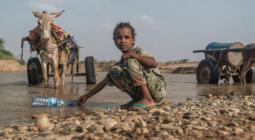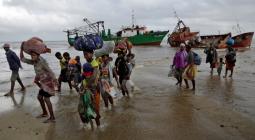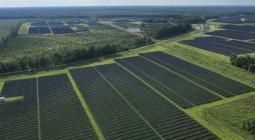Like father, like daughter: why Vanessa Kerry is demanding action on climate and health
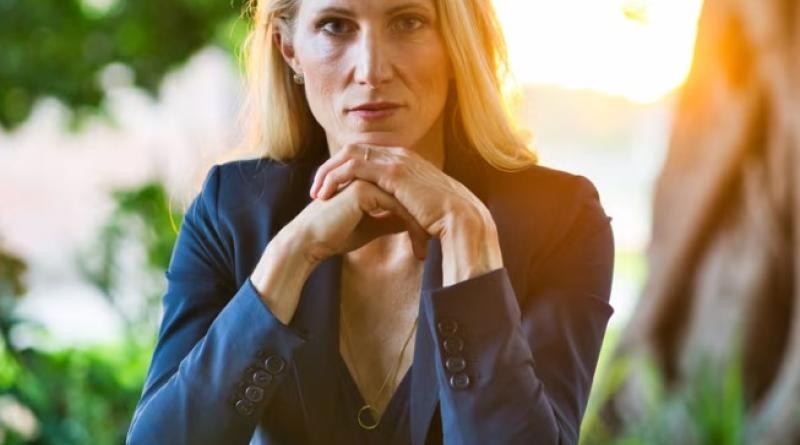
Vanessa Kerry is on a mission. A critical care doctor, she founded – and runs – Seed Global Health, an organisation that trains medics working in poor countries. But now Kerry, 46, daughter of the US politician and former Secretary of State John Kerry, is broadening her reach to embrace a family concern which is urgent for the whole planet: the need to combat global heating which is spreading disease and hampering medical care.
For Kerry, who was recently named by the World Health Organization as its first director-general special envoy for climate change and health, the two issues are urgently interdependent. Nearly one in four deaths in the world are from preventable environmental causes, according to WHO figures. The climate crisis is expected to lead to 250,000 more deaths every year, from causes such as heat stress to the spread of vector-borne diseases such as malaria and dengue. Kerry has seen for herself what is happening in countries where Seed works.
“Malawi has been absolutely hammered by tropical storms in the last years with increased frequency, increased severity,” she says. “In fact, Cyclone Freddy passed over the country twice. What we’ve found is there has been a worsening effect of vector-borne diseases, the malaria season is worse, and the country just went through the longest and the largest cholera outbreak it’s seen in its history, where tens of thousands of people got sick and thousands died.”
The storms in Malawi disrupted the water sources, allowing cholera to spread. Roads and bridges were washed away, preventing pregnant women from accessing safe birthing centres.
“I ended up in a conversation with the World Health Organization, talking about the urgency of climate change and health and the fact that it’s really our next great pandemic,” says Kerry. “We’re in the middle of it.”
At Cop28 in Dubai, which starts at the end of November, Kerry will play an important advocacy role at the first day dedicated to the health impact of the climate crisis.
“I have deep empathy with the fact that we’re tired and this all feels overwhelming, but I also feel very strongly … that actually we have solutions and opportunities,” she says.
“We can meet the challenges of climate change with stronger health systems. If those health systems are also attached to green solar energy, we’re contributing less to the climate problem, we’re building resilient electricity or sources of infrastructure that we need and we can not only meet the health problems that are coming down the pipeline, but we can meet the health problems that we see today.
“Imagine if we could build out the system so they [countries like Malawi] could survive Storm Freddy but then also address malaria and deliver [babies] safely and deliver a vaccine. We know how to do that. We do that all the time. The question is just choosing to do it. We can adapt. That is the opportunity here. So I look at this optimistically – if pragmatically and honestly.”
The moment that set Kerry on her life course came when she was 14, on a visit to Vietnam in 1991. The country, still under US embargo, already had huge significance for her family – her father had served there with great distinction and afterwards was a founder of Vietnam Veterans Against the War. For his daughter, the trip was a watershed moment.
“I was really blown away by the amount of poverty and the lack of resources and the lack of infrastructure,” Kerry says. “I can’t pretend that as a 14-year-old I had a great understanding of what it all meant or what to do with it, but it definitely stuck with me such that when I went to medical school, I knew I had to incorporate that into my career in some capacity.”
She chose to study at Harvard medical school because it was one of the few that had any sort of global programming. While there, she carried out research on immunisation in Ghana. Later she worked in Rwanda. She became convinced that training doctors in Africa was a more sustainable path instead of sending out western volunteer medics. Seed was the result. Over the past 12 years, it has trained, mentored and supported 34,000 doctors, nurses and midwives in sub-Saharan Africa.
Climate concern is something that runs in the family. John Kerry, who signed the Paris climate agreement in 2016 as US secretary of state, is now serving as the US special presidential envoy for climate. His daughter says he, she and her older sister, the actor and film-maker Alexandra Kerry, were all influenced by her grandmother, who was a conservationist before it became fashionable.
But above all, it is Kerry’s work in global health that has brought her to this point, she says. Seeing poor choices over the climate crisis having most impact on the vulnerable countries with the poorest health made the shift necessary for her.
“It’s not acceptable to me to let that gap widen any further. I spent two decades trying to close it,” she says. She talks about watching her eight-year-old daughter sleeping safely in her well-constructed house in the US in September as floods carried away the homes and lives of as many as 20,000 people in Derna, Libya.
“I think that whether we’re talking climate or we’re talking health, it’s the same battle. It’s about investing in human wellbeing, unity, justice and survival – and allowing people to not be punished for where they are born.”
Do she and her father discuss these issues? And who influences who?
“My father’s doing great work and has been for years. I’m very proud to be his daughter and I’ve learned a great deal from him. I’ve learned about never giving up and about optimism; I have learned about being a global citizen and being engaged and fighting for what you believe in; and in the climate context I’ve learned from him, but I’ve also learned from a lot of experts,” she says.
“My work in the climate health space is informed by the work I’ve done for 20 years: my work for Seed and what I’ve seen on the ground.” Kerry adds that ministers of health in the countries where Seed works have told her first-hand about the impact of the climate crisis.
“As a physician coming at this from a health angle, I am now helping him [her father] to understand the ramifications health is having across other sectors and helping him and other policymakers to think about how to incorporate health into their discussions and decision making.”
She and her father talk all the time, she says, most often about her kids and soccer. “I think I see him first and foremost as my father and a grandfather,” she says. She has a son of 11, as well as her daughter.
“They’re in the thick of discovering life for themselves,” she says. “That’s a huge priority. It certainly influences decisions about when and where I go and how much I work. I’m lucky that I have a spouse who understands the importance of the work.”
In February, she gave up her clinical work to focus on her public health role and ensure a balance with family life. Half the time she’s trying to sort the lunchboxes and running down the hall. “There are the days when they say: ‘You forgot to pick up the kids’ – and I say: ‘No, I didn’t – I’m just late!’
“I’m sitting here trying to spin you some story of having my life together and it’s not at all.”
The laughter and honesty are engaging. So is her outspokenness, which in these times of social media might be seen as courageous. Kerry campaigned for her dad’s presidential bid in 2004, when he ran against George W Bush. Would she consider following his example and running for US president?
“My answer has vacillated, to be really honest, throughout the years,” she says. “It’s hard for me to imagine that in the current context because I’m having so much fun. I feel like I’m having so much impact right now and I have more to do here.
Then comes the outspokenness. She shouldn’t go there, she says, but … “The state of politics is really appalling,” she says. “I grew up at a time where I watched people reach across the aisle, there were shared values. We globally are missing shared values … we are actually all fighting for our survival and our wellbeing.
“So, where I personally have expertise and an opportunity to have impact as a physician, and a public health person, and as a mother … there’s a lot that I think I can do here now that I think may not be as impactful in other settings.”
What’s needed, she says, is “really courageous leadership”. In the UK, she says, “it’s appalling what the government has just done to roll back on climate change”.
Kerry says such a rollback grants a sort of “immoral permission for other countries to follow suit at a time when we’re still escalating greenhouse gases. Every decision we make should be turning that around. I think it’s frankly cowardly, even pathetic.
“The reality is we’re dying every day from what’s happening … from extreme weather. I just really feel so strongly that we are fighting for our future. And it’s not just about my kids’ future. It’s quite candidly about yours, mine and everybody who’s alive today, here, now.”
The priorities in Dubai, she says, will be the commitment to reduce greenhouse gases – “all governments have to commit to that” – and mobilise the funding to support communities to adapt, “because if we do not do that we are going to see rises in disease that go unchecked and uncontrolled”.
There could be as many as 1.2 billion climate migrants by 2050 and up to 132 million driven into poverty, 44 million for health reasons. The private sector has to step up too, she says. “Businesses have to realise their long-term sustainability is attached to our planetary and human health and they need to be able to start making decisions that are not just about economic bottom line to shareholders,” she says.
There’s an immense opportunity, she adds, to make some powerful and courageous decisions that will benefit everyone. “I think we should not be afraid of those decisions, but lean into them because I actually think then our leaders will be on the right side of history and be saving people’s lives at the same time.”
Photograph: Jason J Mulikita/The Guardian
